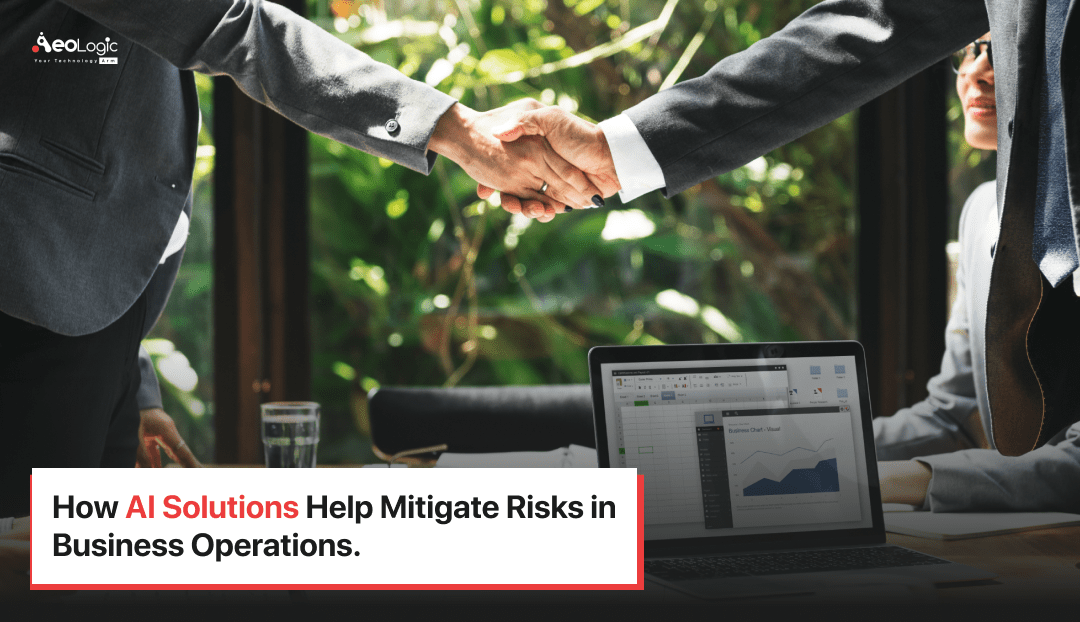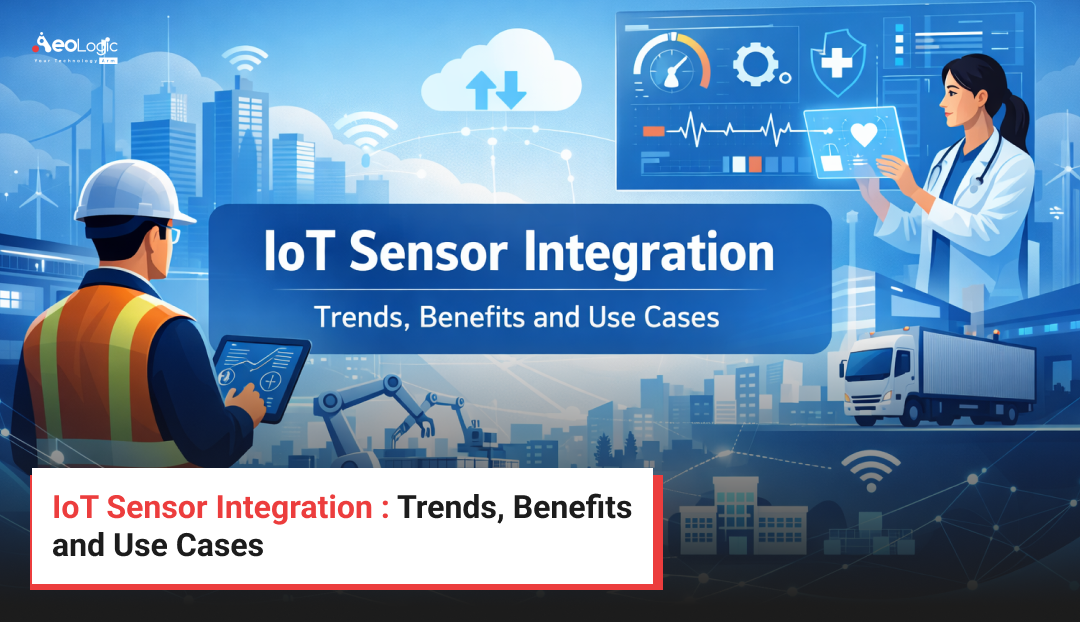Artificial intelligence is arguably the best technology that has developed in the last decades. This technology is ruling the world by implementing it in various sectors. Manufacturing, pharmaceuticals, healthcare, marketing, businesses, logistics, banking, education, agriculture, etc., industries have implemented AI solutions for various operations management and got benefits most of the time. This technology is not just ruling the industry but also playing a crucial role in the global market, as the market size in the artificial intelligence market is projected to reach US$243.70bn in 2025. The market size is expected to show an annual growth rate (CAGR 2025-2030) of 27.67%, resulting in a market volume of US$826.70bn by 2030.
Overview: AI in Business
There are various benefits of AI in businesses, like enhanced efficiency, supply chain management, automation, insights, analysis, etc., but apart from all benefits, there is another benefit which is the ability to mitigate risks. It has the immense capability to detect and mitigate issues for many industries or businesses in an efficient manner. There can be various use cases of AI in risk mitigation, such as fraud detection and prevention, market risk analysis, anti-money laundering system development, cybersecurity threat detection and mitigation, supply chain risk management, drug safety in pharmaceuticals, portfolio risk prediction, etc. Later we will see these use cases and benefits in detail as we move forward in the article.
Also Read: Why AI Solutions are Key to Driving Business Growth
Artificial intelligence has been implemented in various industries to manage and mitigate various types of risk. The Global AI Model Risk Management Market grew from USD 6.66 billion in 2023 to USD 7.51 billion in 2024. It is projected to be worth $6,428.44 million in 2025 and grow at a compound annual growth rate (CAGR) of 12.8% by 2034.
We have completed the introductory paragraph, which clearly introduces the topic. Now, we need to discuss some additional details, such as some top use cases and challenges of AI in mitigating risk in businesses. Finally, we will conclude the discussion with a summary.
AI Solutions to Mitigate Risks in Business Operations
Artificial intelligence generally trains on various machine learning algorithms and natural language processing which makes it vulnerable for mitigating risk factors in various business operations. Artificial intelligence generally analyzes vast amounts of data and produces insights that can give proper predictions about the risk factor. This enables businesses to take precautions before any damage occurs. Many use cases definitely make you more clear about AI solutions in risk mitigation.
Custom AI Solutions | AI Automation Agency in India
Top Use Cases of AI Solutions for Mitigating Risks in Business Operations
There are many use cases for AI solutions to mitigate risks in business operations. Below are a few.
Fraud Detection in Banking
The banking industry is one of the most sensitive in terms of finances and must be managed efficiently. There are many cases registered regularly of fraud or risk, like scams, wrong transactions, wrong claims, etc. With AI solutions, it is possible to analyze every transaction and identify patterns. Any irregularity in patterns warns the baking industry about the risk factors.
Market Risk Analysis
Marketing is another industry that needs to manage operations carefully and efficiently. It is important to have analytics and reports to manage fund investment and withdraw investment before loss. With AI solutions in business, investors can predict the market behavior and risk factors that enable them to move with the market shift. This overall reduces the chances of potential losses.
Also Read: Artificial Intelligence Solutions to Enhance Your Business
Cybersecurity Threat Detection
Every business has its cybersecurity aspects that need to be strong to mitigate any cyberattacks or any chances of data breaches. The implementation of AI solutions enhances cybersecurity threat detection by analyzing any unusual pattern or multiple unsuccessful chances of login to the system. This overall protects the sensitive data and information of the businesses.
Drug Safety in Pharmaceuticals
The pharmaceutical industry deals with many risks regularly while developing drugs for patients. There could be various conditions, like a wrong chemical reaction, that could affect the patients and risk their lives. AI solutions can help to analyze the chemical reaction and warn before the occurrence of too much damage. AI can also be used to analyze various patients’ data to find out the reaction symptoms and reasons.
Vehicle Diagnostics
Many accidents are happening nowadays due to malfunctions of vehicles. This results in risk to people’s lives, and this is a serious concern worldwide. With the implementation of AI solutions, it is possible to analyze any potential risk or defect in the engines of vehicles that mitigate the risks of accidents. AI solutions also analyze the condition of the parts that help to change them before worsening.
Challenges with AI Solutions in Business Operations
We have seen various cases of AI solutions being used to mitigate risks in business operations. But there could be a few challenges too, as there are a few mentioned below.
- Data aggregation in large organizations can be a challenge, as data spread over many departments makes it complex to analyze for AI solutions.
- Overconfidence in AI can sometimes result in not being able to detect some risks in businesses. So human intervention is important too.
- Compliance can be another challenge, as the organization of detailed information on AI-powered decisions is hard to present with complex models.
Also Read: How AI is Helping Business Get Off the Ground
Final Words
Artificial intelligence’s ability to analyze data can prove a important factor in risk detection and prevention. In fact, various businesses already implemented this and managed their risk factors efficiently. There are many use cases of AI in various business operations like banking fraud prevention, supply chain risk management, market risk analysis, drug safety enhancement, cybersecurity threat detection, and mitigation, etc. While there are a few challenges too, like cost, complexity in models, integration complexity, data aggregation, overdependence, compliance issues, etc., the benefits are too good to outweigh the challenges. Overall, with the careful and rightful implementation techniques, AI can prove a great investment for businesses to make their operation risk-free.
FAQs
What are the main risks businesses face in operations?
All businesses face different categories of risk that can impact their ability to run daily operations and whether they can fully perform. Operational risks originate mainly from entities, processes, systems, and external forces, and include all possibilities involving people, machinery malfunctions, or perceived errors (like entering data incorrectly), defective product manufacturing, decision errors, etc. Even mistakes can cause production stoppage, delays, rework or poor quality and could lead to excess costs.
All businesses have significant operational risks from disruptions to supply chains. Supply chains can be disrupted by arrival delays from suppliers, transportation delays, increased demand, and the inability of suppliers to acquire or engage other suppliers on behalf of the lead supplier (sub-suppliers).
Fiscal operational risks are budget overruns, theft, and fraud. Losses in any operational area can reduce stability and growth. Last, non-compliance to industry standards and regulations can result in fines and/or end product-related legal risk and reputation damages.
How does AI improve risk communication within organizations?
AI tools provide clear dashboards and alerts that keep teams informed about current risks. This real-time communication helps employees respond quickly and coordinate effectively, reducing the impact of risks on operations.
Does AI help reduce human error in operations?
AI can significantly decrease human error in business by reducing any lapse in business operations. Many operational errors stem from human work performed in manual and repetitive cycles, which can be exhausted, inattentive, or in error. AI-powered automation systems take over repetitive processes, such as data entry, inventory management, quality control, etc., with comparable precision and they will not exhaust.
AI algorithms will learn continuously to detect patterns or anomalies that humans may not have. This will help detect any potential for error timely manner so that corrections can be made, and problems do not compound. In industries such as manufacturing, healthcare, and finance, the real-time recommendations provided by AI provided decision support tools that help minimize judgment errors associated with more human agency while boosting accuracy.
Overall, the benefits of AI bring not only accuracy but efficiency, repurposing human employees for more worthwhile strategic work; and significantly improves overall risk exposure with virtually no potential for human error.
Is AI cost-effective for managing risks in business operations?
AI solutions are incredibly cost-effective for executing risk management in business processes. While the start-up cost for AI equipment and implementation can often be considerable, the long-term savings and associated benefits can far outweigh these start-up costs. AI acts to automate the risk identification and risk monitoring processes that typically require large teams of people completing laborious manual administrative tasks.
By identifying potential threats to the business (e.g., fraud, system failures, compliance gaps) early, organizations can often avoid costly disruption and revenue loss. Additionally, as AI accelerates and informs decision-making processes, businesses become more efficient in terms of operations and are less likely to waste time and resources or commit errors.
Over time, this can lead to a reduction in operating costs, amplification of productivity, and an increased competitive advantage, a sensible spend with AI solutions for organizations managing their risk.

I’m Deepika Pandey, an SEO strategist and content writer with 6+ years of experience. I create SEO-friendly content that drives traffic and engages readers. I combine data insights with creativity to help businesses grow their online presence effectively.







